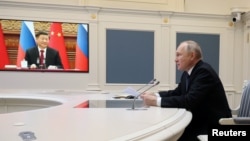In an interview with Russia’s TASS state news agency, published on January 3, Russian Deputy Foreign Minister Andrey Rudenko said China entirely agrees with how Russia is defending its sovereignty and territorial integrity:
"Russian-Chinese cooperation is experiencing the best period in its history, bilateral relations ... are built on a solid foundation ... of mutual support in matters affecting each other's fundamental interests. First of all, we are talking about the protection of sovereignty and territorial integrity."
That is misleading. China does not support Russia's territorial claims to the five Ukrainian regions it has partially occupied, including Crimea. Beijing has not provided Russia with weapons in its war with Ukraine and has been forced to partially participate in the Western sanctions against Russia.
China and Russian annexations
In February 2014, Russia occupied Ukraine’s Crimean peninsula, and, after a referendum deemed illegal under Ukrainian law, the Kremlin declared Crimea a Russian territory.
On March 15, 2014, the United Nations Security Council considered a resolution to invalidate the results of Russia’s disputed referendum in Crimea, which was planned for the following day, March 16, and reaffirmed Ukraine's “sovereignty, independence, unity, and territorial integrity.” Fifteen council members voted in favor of the measure. Russia opposed it and China abstained.
On March 27, the U.N. General Assembly adopted a resolution “calling upon states not to recognize changes in status of Crimea region.” One hundred countries supported the resolution, Russia and 10 other countries rejected it, and China abstained along with 57 other U.N. members.
On April 16, 2021, Ukrainian Deputy Foreign Minister Yevhen Yenin wrote on Facebook that Chinese Vice Foreign Minister Le Yucheng had confirmed that China continued to recognize Crimea as part of Ukraine:
"The key thing is that the government of China does not recognize Russia's attempted annexation of Crimea and has informed the country's central and regional authorities about a ban on contacts with the peninsula's occupation authorities."
On February 24, 2022, Russia launched a full-scale invasion of Ukraine, seriously escalating the conflict that began in Ukraine’s Donbas region in 2014. Following internationally rejected referendums in September, Russia announced it had annexed four partially occupied Ukrainian regions - Luhansk, Donetsk, Zaporizhzhia and Kherson.
On October 12, 2022, the U.N. General Assembly adopted a resolution calling on countries not to recognize Russia's referendums and illegal attempt to annex the four Ukrainian regions, with 143 member states voting in favor. Russia voted against it, as did four other authoritarian states - Belarus, North Korea, Nicaragua and Syria. China and 34 other countries abstained.
China and Russia's arms shortage
Since the Russian invasion of Ukraine began in February 2022, Beijing has repeatedly said it does not and will not supply Moscow with weapons. This position is widely attributed to U.S. pressure on China.
On March 17, 2022, the eve of U.S. President Joe Biden's video meeting with Chinese President Xi Jinping, U.S. Secretary of State Antony Blinken said that one of the main U.S. messages to Xi would be that the U.S. would punish China if Beijing provided military aid to Russia.
Three days after the video call between the two leaders, China's Ambassador to the U.S. Qin Gang unequivocally denied that China would provide military assistance to Russia.
“There's a disinformation about China providing military assistance to Russia,” he told CBS News' “Face the Nation.”
“We reject that. … Not weapons and ammunition to any party and we are against a war, as I said, you know, we will do everything to deescalate the crisis.”
On June 30, the Reuters news agency, citing an anonymous senior U.S. official, reported that the U.S. had not seen China dodge sanctions or supply weapons to Russia.
"China is not providing material support,” a senior Biden administration official told the news agency on condition of anonymity. “We have not seen the [People's Republic of China] engage in systematic evasion or provide military equipment to Russia."
According to U.S. officials, as of December 30, 2022, Beijing had not provided material support to Russia's war against Ukraine.
China and pressure on Russia to end the war in Ukraine
As the major Western economies responded to Russia’s invasion of Ukraine with unprecedented coordinated sanctions, China and India became the primary buyers of Russian oil. As a result, Russia has overtaken Saudi Arabia as China's top supplier of crude oil. But Reuters, citing trade sources, reported that Chinese refineries reduced purchases of Russian crude in anticipation of the European Union’s bans on the import of Russian oil and refined petroleum products.
The EU’s ban on Russian oil imports came into effect on December 5, 2022, and its ban on refined Russian petroleum products is set to come into effect on February 5, 2023.
More than 1,000 Western companies have left Russia since Russia launched its full-scale invasion of Ukraine. Chinese companies are also pulling out or have put their activities in Russia on hold. In December, China’s telecommunications and smartphone giant, Huawei, said it was disbanding its enterprise business team in Russia "in further pullback amid Western sanctions."
The Kyiv School of Economics reported on December 26, in its weekly digest on the impact of foreign companies’ exit from Russia, that:
- “The Chinese car manufacturer Lifan stopped selling new cars on the Russian market, not selling a single car in 2022.
- drone company DJI will temporarily suspend all business activities in Russia and Ukraine… to try to keep drones out of the conflict.
- payment system UnionPay has limited work with Russian acquirer banks that are under sanctions.
- the TikTok social networking application suspended the access of users from Russia to conducting live broadcasts and posting new content.”





